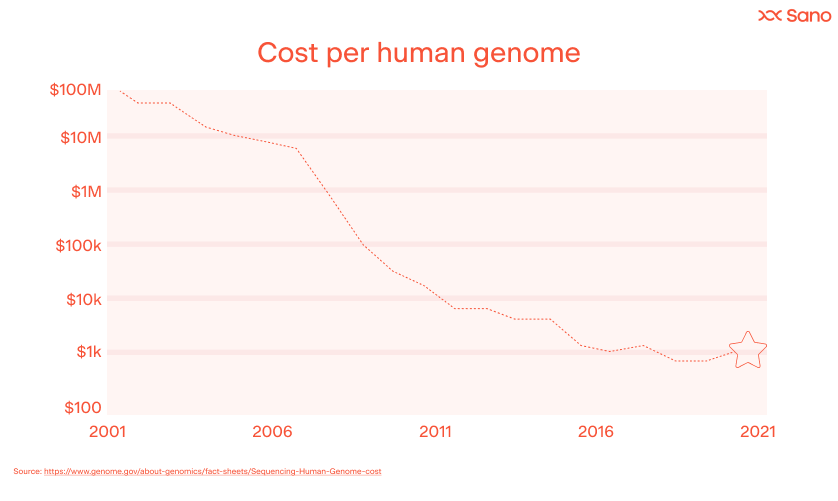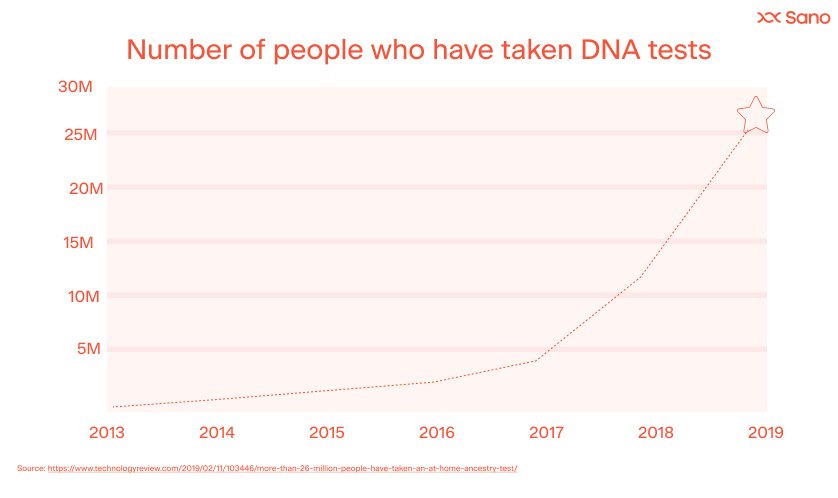The pivotal role of genetic counselling in biotech and pharma precision medicine

The relationship between DNA and health is being understood better every day. We now know that our genes affect our risk of disease, symptoms, and even how we react to medications. But with genetic testing becoming a more prominent part of healthcare, genetic counsellors play a vital role in supporting people through the process and helping them understand the results of testing and what it means for them as patients. In this blog, we'll discuss the importance of genetic counsellors and how they bridge the gap between scientific advancement and patient care.
The rise of precision medicine research
The advent of high-throughput DNA sequencing technologies has made genetic testing faster, cheaper, and more accessible, enabling individuals to access genetic testing directly and contributing to the growth of direct-to-consumer genetic testing services. The below graphs illustrate these advances – the cost per human genome has gone from $100M+ in 2001 to under $1,000 in 2021. And, the number of people who have had their DNA sequenced has risen exponentially. 

Precision medicine, sometimes called personalised medicine, is making use of this genetic data to move away from the outdated "one size fits all" approach to healthcare, where treatments are prescribed based on average results from broad population studies. Instead, precision medicine tailors medical decisions and interventions to each individual by leveraging the DNA data of patients to choose the most appropriate treatments, therapies, and preventive measures. A real-world example can be seen in the antidepressant drug amitriptyline, which is influenced by two genes called CYP2D6 and CYP2C19. Both of these genes affect how quickly the body breaks down amitriptyline. A healthcare provider may therefore use pharmacogenomics to adjust dosage depending on the DNA of their patient to minimise adverse reactions and to make sure the drug is as effective as possible.
As more individuals have their genomes sequenced and integrated into their medical records, the more prominent personalised medicine will become in our healthcare sectors.
The integral role of genetic counselling
Genetic counselling is a vital part of integrating genetic data into healthcare. It encompasses several key functions:
1. Providing educational support and emotional guidance
Genetic counsellors, as experts in their field, assist patients undergoing genetic testing. They offer emotional support and educational resources, helping patients understand their results and prepare for potential outcomes. This support is crucial when dealing with the complexities of DNA sequencing, which can reveal risk factors for various hereditary disorders.
2. Facilitating informed consent
These professionals play a critical role in ensuring patients fully understand genetic testing's implications. They guide individuals through the complexities, explaining the benefits, risks, and limitations to aid in informed decision-making, thus avoiding unnecessary costs and misinformation.
3. Simplifying complex information
A key function of genetic counsellors in precision medicine is to make complex genetic information accessible. They demystify scientific terms and data, enabling patients to make educated healthcare decisions.
As genomics becomes more prevalent in healthcare, genetic counsellors are increasingly vital for both providers and patients. They ensure appropriate testing and support, prioritising patient care and understanding.
Empowering patients through genetic counselling
Genetic counselling empowers patients in their healthcare journey. This is especially important as direct-to-consumer genetic testing grows more common. Counsellors help patients by:
- Reviewing genetic information and its implications.
- Exploring the psychosocial aspects of genetic data.
- Recommending appropriate screenings or treatments.
- Collaborating with healthcare providers.
This approach enables patients to actively participate in their care, making informed decisions about their treatment plans. Moreover, genetic counselling offers a critical layer of psychological support, providing a safe space for patients to express emotions and concerns related to their genetic information.
Building trust and enhancing research outcomes
Genetic counselling services are pivotal in building trust among patients, researchers, and healthcare providers, leading to a more informed and engaged patient community. This trust, anchored in clear and transparent communication, is crucial for enhancing the quality of research outcomes, ensuring data integrity, and maintaining the ethical standards of the research process. Key contributions of genetic counsellors include:
1. Establishing trust with transparent communication
Genetic counsellors serve as vital links within the healthcare system, translating complex genetic information into understandable language for patients. This clarity fosters trust, not only with patients but also among healthcare providers. It facilitates informed decision-making and encourages patient involvement in their healthcare journey.
2. Boosting patient engagement in research
Informed patients are more likely to be proactive in research initiatives. Through genetic counselling, patients gain a thorough understanding of genetic testing, personalised treatment options, and the significance of their genetic data in research contexts. This empowerment leads to increased patient participation and commitment to research projects.
3. Enhancing research outcomes
Active patient participation, driven by informed engagement, contributes to more consistent and prolonged involvement in research studies. This heightened engagement allows researchers to collect more comprehensive data, furthering advancements in areas like pharmacogenomics and genetic research.
4. Upholding ethical standards in research
Genetic counsellors play a critical role in maintaining transparency and ethical integrity in research. They provide impartial, patient-centric advice in an environment often swayed by commercial interests and diverse stakeholder views, including those from pharmaceutical companies, medical professionals, and investors. This unbiased approach ensures that patients receive accurate information and guidance, enabling them to make decisions that truly reflect their best interests. Simultaneously, it helps uphold the highest ethical standards in research.
Genetic counselling is integral to fostering a trustworthy, informed, and ethically sound healthcare environment, significantly benefiting both research outcomes and patient welfare.
Challenges and expanding access
Genetic counselling is essential for patients and healthcare providers, but its widespread availability faces challenges. Key among these is the limited number of genetic counsellors, a factor that restricts access to expert genetic advice in the United States, the United Kingdom, Europe, and other regions.
Addressing the shortage of genetic counsellors
The scarcity of genetic counsellors creates a bottleneck in providing specialised genetic services. Efforts are underway to mitigate this issue. Training programs and certification initiatives are being developed to expand the pool of qualified genetic counsellors. This expansion aims to meet the increasing demand for genetic expertise.
Navigating reimbursement issues in the US
In the United States, a significant hurdle is the fact that the Centers for Medicare and Medicaid Services (CMS) does not currently recognise genetic counsellors as healthcare providers. This limitation restricts the availability of genetic counselling for many people. However, there is progress in this area. The Access to Genetic Counselor Services Act of 2019, proposed in Congress, aims to address this issue, though it has yet to be passed. Its approval would significantly broaden access to genetic counselling services.
Leveraging remote genetic counselling
To overcome geographical barriers, telephone-based and other remote genetic counselling services are gaining popularity. These services allow individuals in rural or remote areas to access expert genetic counselling, making it more inclusive and accessible.
Collaborative efforts for wider access
The expansion of genetic counselling services relies heavily on collaboration among biotech companies, pharmaceutical firms, and healthcare institutions. By recognizing the value of genetic counselling and pooling resources, these stakeholders can play a crucial role in ensuring that a wider population benefits from informed healthcare decisions and contributes to ethical research advancements.
While there are challenges in making genetic counselling services widely available, ongoing efforts and collaborations are paving the way for more accessible and inclusive genetic healthcare in the future.
Conclusion
Genetic counselling is not merely a service but a catalyst for a future where genetics plays a central role in healthcare, and individuals are empowered to make informed choices about their well-being, all while making sure that research is as ethical as possible. In addition to the benefits it holds for patients, genetic counselling also supports research and healthcare in many ways and will be of vital importance as we work towards a future of personalised medicine.
For more information on how Sano offers genetic testing and counselling, please download our Sano DNA testing backgrounder:

